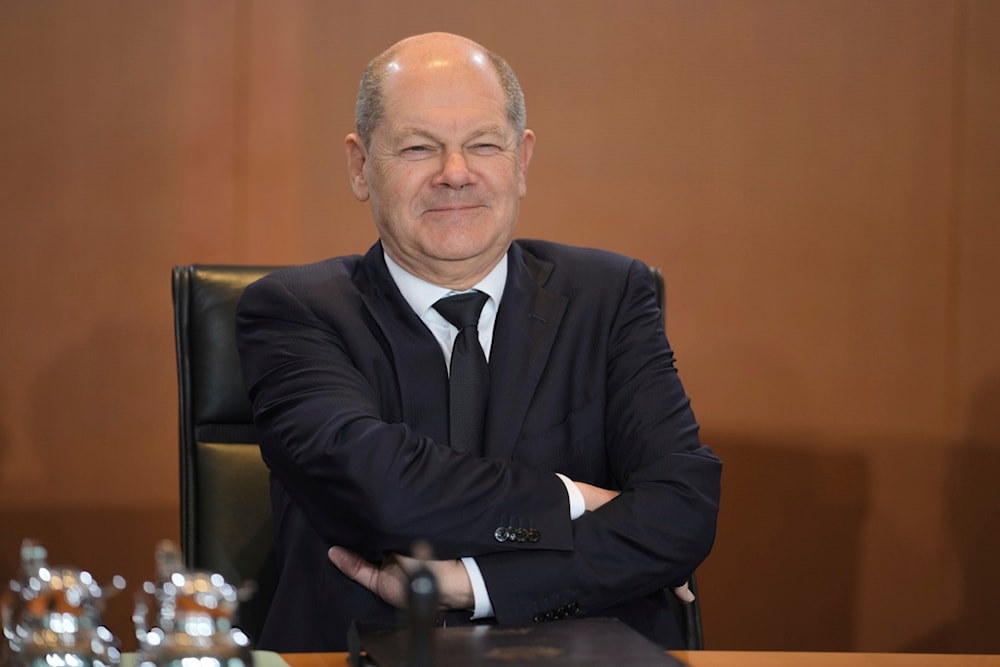Scholz, a snitch? UK accuses Germany for 'flagrant abuse of intel'
Now that the information is out in the open, could Russia use it to its advantage in the conflict with Ukraine?
-

German Chancellor Olaf Scholz chairs the cabinet meeting of the German government at the chancellery in Berlin, Wednesday, Feb. 28, 2024 (AP Photo/Markus Schreiber)
A report by the British online newspaper The Independent on Thursday revealed that German Chancellor Olaf Scholz is under fire for allegedly revealing details of British aid for Ukrainian forces, with accusations of a "flagrant abuse of intelligence."
On Monday, Scholz made statements in which he indicated that Germany would not be following the lead of the UK and France in providing certain types of military assistance to Ukraine.
German soldiers, he said, could not follow the lead of their British and French allies in "the way of target control and accompanying target control."
He was specifically referring to Germany's refusal to supply Kiev with Taurus missiles due to the associated risk of becoming directly complicit in the Ukraine war.
By publicly highlighting the actions of the UK and France, particularly in relation to the provision of long-range missiles, Scholz indirectly disclosed details of British aid for Ukrainian forces.
This disclosure raised concerns as it revealed sensitive information about the nature and extent of aid provided by other countries.
"This is a flagrant abuse of intelligence deliberately designed to distract from Germany’s reluctance to arm Ukraine with its own long-range missile system," said Tobias Ellwood, the former chairman of the Commons defense committee.
He added that Scholz's argument will "no doubt be used by Russia to racket up the escalator ladder".
Read more: Scholz fears complicity if Germany supplies Kiev with Taurus missiles
The report further discussed the pressure faced by the Chancellor in his own country for not delivering the weapons requested by Ukraine.
Despite calls from both within Germany and from Ukrainian President Volodymyr Zelensky for such weapons, German lawmakers voted against explicitly sending Taurus long-range cruise missiles.
Instead, a motion was passed urging the government to maintain military support, leaving room for interpretation regarding the specific types of weapons to be provided.
Moreover, comments made by Scholz about the UK and French assistance in operating long-range cruise missiles used in Ukraine have raised concerns and sparked further debate about Germany's role in the conflict.
Norbert Röttgen, a senior lawmaker from the CDU, slammed the statements as "irresponsible" and warned that his comments could escalate the situation.
"The chancellor’s statement regarding France and Britain’s alleged involvement in operating long-range cruise missiles used in Ukraine is completely irresponsible."
Read more: Scholz: NATO does not see itself at war with Russia
Amid these disputes, aid for Ukraine on the part of the US continues to stall, leaving the EU to provide whatever remains of its arsenal to support Ukraine.
Earlier this week, French President Emmanuel Macron suggested sending NATO troops to Ukraine.
During his comments, he vowed to do everything to prevent Russia from winning the war.
Macron said he could not rule out deploying soldiers to Ukraine, even though Western leaders were unable to achieve an agreement on the issue during a Paris-hosted Ukraine meeting.
German Defense Minister Boris Pistorius stated that Macron's suggestion to immediately intervene in the Ukrainian war had no support among the leaders and that Germany would not consider such an action.
An anonymous senior European defense official revealed to the Financial Times earlier today that Macron’s remarks were an attempt to pressure Russia, since "everyone knows there are Western special forces in Ukraine – they’ve just not acknowledged it officially."
It is worth noting that Russia has repeatedly reported strikes against “foreign mercenaries” in Ukraine. Russia’s Defense Ministry announced last month the killing of over 60 foreign fighters in a missile strike, of which the majority were French speakers, according to local sources.

 4 Min Read
4 Min Read









